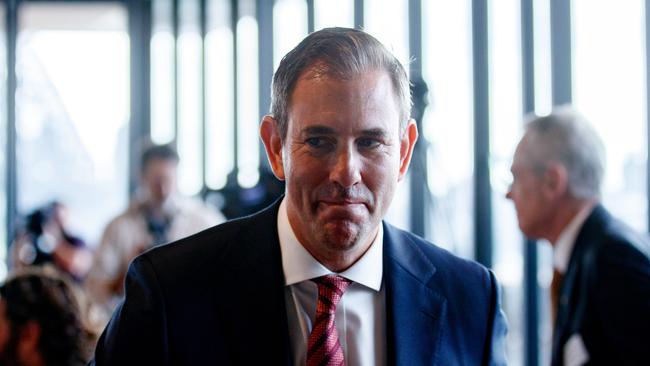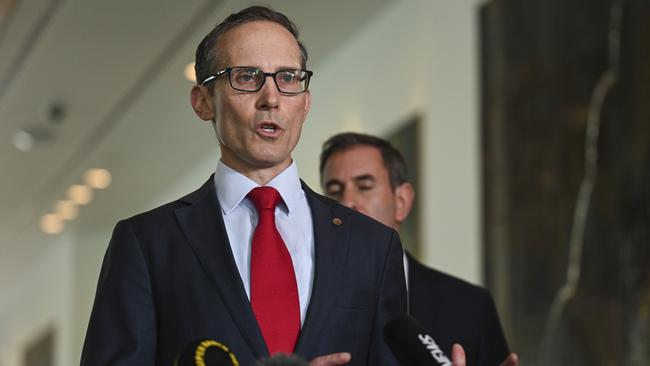
Real benefits flow when actual new competition is introduced into the economy.
By way of example, if you want to improve competition in home loans you can stop ANZ buying Suncorp or you can open the rules to let superannuation funds lend money to members – opening the game to a new entrant.
ANZ of course was eventually allowed to buy Suncorp because the court figured it would not shift the dial meaningfully in competition terms, and also there is some increased competition through the efforts of mortgage brokers who are the major source of new loans to every major except CBA.
The key point is that a combination of competition policy to bring new entrants and competition law is needed to boost productivity, as former Productivity Commission chief Peter Harris will argue in a Queensland Uni podcast next week.
Policy removes the roadblocks to new entrants.
Merger control is essentially backward looking, and Chalmers needs to look forward to establish systems to handle new technology, digital platform control, interoperability and other ways to adapt to the new changes.

Competition Minister Andrew Leigh, in a speech this week, promoted his decision to require data providers – including car manufacturers – to make motor vehicle service and repair information available for purchase by all Australian repairers and registered training organisations at a fair market price.
Increased data sharing breaks down barriers to competition.
Separately, Craig Emmerson’s interim Grocery Code review this week unwittingly opened a potential anomaly given under the voluntary code the big supermarkets are already liable to $5m in supplier compensation for code breaches.
That happens under the voluntary code and now Emmerson wants a mandatory code complete with penalties, which begs the question – apart from bigger penalties where is the step forward, remembering the code governs supplier relations not consumer prices?
Chalmers has already opened the door slightly to competition policy changes with the PC to assess the impact of a list of proposed changes presented by Treasury and the states.
This is a work just in progress and it must be stated the government’s own track record on reform is extraordinarily slow, as evidenced by horrendous delays in introducing new controls on digital platforms like Google, Meta and Apple.
Late last year, some 18 months after receiving ACCC requests for new industry codes to allow more comprehensive controls, the government said it would consider the changes after another 12 months consultation.
This week’s merger reforms won’t come into effect until January 2026 and the PC is still waiting for its first reform package to consider.
As former ACCC boss and competition task force member Rod Sims has said, the digital platform responses were at best tepid.
Ironically Chalmers said his reforms, to take effect in 20 months, will make the ACCC “faster, stronger and simpler”, impressive goals which are yet to be tested.

One key change which went largely unnoticed was the appointment of Frontier Economics founder and former Melbourne Uni economics professor Phillip Williams as the new mergers commissioner when he starts mid year.
The incumbent, former King &Wood Mallesons partner Stephen Ridgeway will (states willing) stay on as an associate commissioner.
Williams has provided the economic advice on most key mergers for many years, most recently including for ANZ in its Suncorp merger, the ACCC in the Armaguard-Prosegur snafu and Australian Clinical Labs in the Healius deal.
His Frontier partner, infrastructure guru Danny Price, will take sole charge of Frontier as Williams completes the competition mafia (lawyers and economists) takeover of the ACCC, joining former clients Liza Carver (enforcement) and Gina Cass-Gottlieb (chair).
Missing on the commission are folk with a strong operating business pedigree.
The ACCC will boost staff numbers in its merger division to cope with the expected extra notifications and assuming the legislation is approved will issue a series of advisory notes telling practitioners how the new the regime will work.
The mergers branch which also includes digital platforms has around 100 people, which varies with deal flow complexity.

Its work will be cut out in the next couple of years in advising parliamentary drafts people on the changes, with the aim of the bill getting to parliament in September, the thresholds to apply for compulsory notification, and then assuming safe passage explaining the changes to the mafia.
The thresholds are complicated by a proposal to give ministers the power to vary threshold levels for different industry sectors, which as a matter of principle fundamentally conflicts with the ACCC’s statutory independence.
Another change is the ACCC will start charging between $50,000 and $100,000 for new applications, plus extra fees if the filing is amended to seek public benefit approval.
FIRB charges similar fees but the ACCC now only charges for authorisation applications.
The new charges are meant to be cost reflective, so more complex deals cost more but small business will get waivers and, to put them into context, the cost recovery measures are tiny compared to the millions in legal fees on complex deals and tens of millions in investment banking success fees.
The changes give the ACCC unprecedented new powers over the merger regime but it is expected to respond with increased disclosure, including detailed reasons for decisions.
From 2026 new applications will be with the ACCC for 30 days, during which time it may decide to study the matter further and this will take another 90 days.
There is an option to provide fast-track approval in 15 days but mergers cannot proceed until the ACCC gives its tick or the relevant deadline passes in cases of no action.

After the extra review period applicants can (but not before) seek a Competition Tribunal review and or seek a decision on public benefit grounds.
This will take another 90 days and of course this timetable is subject to amendment at the ACCC’s discretion.
The tribunal is meant to provide a greater focus on economic analysis and consideration of market structure and less on evidentiary issues.
From the ACCC perspective the three key changes from Chalmers are compulsory notification of mergers, new principle-based merger rules including blocks on anything which entrenches the dominance of existing powers (think Transurban, supermarkets, Bunnings, Qantas and the list goes on), and the power to include transactions in the previous three years in assessing mergers.
The focus on notification is a beat up because the reality is on any questionable deal competition lawyers know the importance of notifying the ACCC to avoid getting slammed by the regulator.
The main offenders in the lack of notification are private equity firms hoovering up competitors in so called roll-up deals to sell at inflated values and chief executives who think they know the law better than their advisers.
Now comes filling in the devil’s details.




Federal Treasurer Jim Chalmers has made a step forward to improve Australia’s competitiveness but changes to merger laws simply draw a line in the sand, maintaining the status quo.